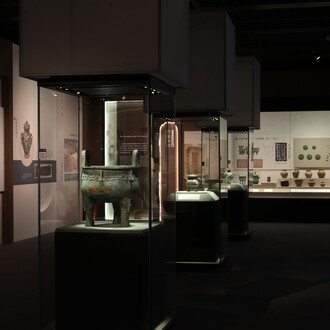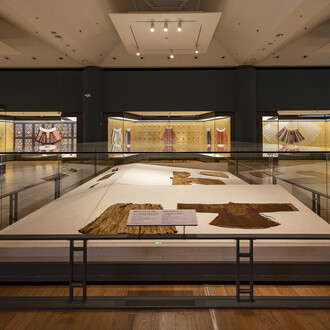President Xi Jinping mentioned that, the ancient civilizations of China and Greece flourished on opposite sides of the Eurasian continent more than two millennia ago, laying the foundation for the development of human civilization.
When we mention ancient Greece, we think of world-famous figures such as Solon, Pheidias, Socrates, Plato, Aristotle, Alexander, Euclid, Archimedes, and so on. As one of the sources of Western civilization, ancient Greek civilization has unique charm and has left many valuable cultural legacies to human society. A civilization with brilliant achievements must be supported by a society with a long history, rich cultural accumulation, frequent exchanges and interactions, and full of vitality. This was true of the ancient Greek civilization.
This exhibition presents to the visitors the social and cultural features of different periods of ancient Greek civilization, showing a panoramic history of Ancient Greece.
We aim to foster the cultural inheritance and development and promote exchanges and mutual learning among civilizations by the way of international cultural communications.
Aegean civilization
Around 3000 BC, the earliest Greek civilization emerged in the Cyclades Islands, known as the Cycladic Culture. It featured some unique cultural elements, such as distinctively crafted small figurines, which are outstanding examples of Ancient Greek art.
Following the rise of the Cycladic Culture, the Minoan civilization emerged on the Greek island of Crete. Also known as the Cretan civilization, the Minoan civilization was one of the early Bronze Age civilizations in the Aegean region, spanning approximately from 3000 BC to 1100 BC. The remains of the "Minoan palaces" still standing today testify to its ancient glory.
The Mycenaean civilization represents the Bronze Age culture that flourished on mainland Greece from approximately 1600 to 1100 BC. Scholars named this civilization after the city of Mycenae, which was the most powerful kingdom during that period mentioned in Homeric epics. The Mycenaean culture developed through trade and cultural exchanges in the Aegean and Mediterranean regions. The remains of the palaces, city walls, and noble tombs, along with the elegant gold and pottery vessels unearthed from them, make the Mycenaean civilization the best example of Greek Bronze Age civilization.
The rise of city-states
After the collapse of the Mycenaean civilization, Greek history entered a relatively dull period, during which writing disappeared and archaeological sites became scarce, leading to what is known as the "Dark Ages." This period is often referred to as the "Homeric Age," as it is believed to reflect the social context described in the epics attributed to the blind poet Homer.
The "Homeric Epics" refers to two long epic poems, The Iliad and The Odyssey, which mark the beginning of Western literature. Although these epics are generally thought to have been composed between the 9th and 8th centuries BC, they feature heroes from the earlier Mycenaean period, allowing us to glimpse aspects of society during both the Mycenaean and Homeric eras.
The "Homeric Age" was followed by the "Archaic Period" (c. 8th century-6th century BC). This period saw the gradual formation and development of various Greek city-states. During the Archaic Period, the Greeks extended their activities beyond the Greek peninsula and the Aegean Sea to the regions around the Mediterranean and the Black Sea, where they established a number of colonial city-states.
The Archaic Period also witnessed the emergence of formative and plastic arts. Following the spread of the geometric style, cultural and artistic influences from the East, brought by trade, began to shape Greek art. The Greeks, in turn, absorbed these Eastern elements and developed their own distinctive style.
Classic period
The Classical Period of Greece stretches from the early 5th century BC, beginning with the Greco-Persian Wars, to the 320s BC. This period was marked by intense warfare and conflict, starting with the wars between the Greeks and the Persian Empire, followed by the rise of Athens, and culminating in the Peloponnesian War between the two great military alliances led by Athens and Sparta. The 4th century BC was no different; after the Battle of Mantinea in 362 BC between Thebes and Sparta, the historian Xenophon lamented, "The results of the war were the opposite of what people had expected... Greece was left more disordered and chaotic than before the war."
Despite the turmoil, the Greeks achieved unprecedented political and cultural progress during this period. The Athenians established and gradually refined their ancient democratic system, making invaluable contributions to political theory and the practice of social organization. In addition to architectural marvels such as the Parthenon and literary achievements exemplified by Greek drama, the Classical Period also produced notable historical figures such as Herodotus, known as the "father of history," the physician Hippocrates, and philosophers Socrates and Plato. Each made significant contributions in their respective fields and left a lasting impact on human history.
Macedonians and hellenistic world
The Kingdom of Macedonia was located in the remote northeastern region of Greece. After ascending to the throne, King Philip II dedicated himself to the governance of his kingdom, resulting in a rapid rise in Macedonian power. In 337 BC, Philip II convened a meeting of the Greek city-states in Corinth, establishing the principle of ending internal conflicts among the Greeks and uniting against Persia. This was a landmark event in Greek history.
In 336 BC, Philip II was assassinated, and his son Alexander ascended the throne. Through a series of military campaigns, by the time of his death in 323 BC, Alexander had built an unprecedented empire spanning three continents—Europe, Asia, and Africa. The creation of Alexander's empire marked the beginning of the Hellenistic Era. Although the empire did not last long, its establishment accelerated cultural exchange between East and West, opening a new chapter in world history.
Epilogue
Throughout the extensive course of human history, various peoples have created civilizations characterized by distinct traits. Despite geographical separations and diverse natural landscapes, ancient civilizations such as those in China and Greece cultivated rich and vibrant cultural heritages that have left an enduring impact. These two remarkable ancient civilizations -- one situated in the eastern part of the Asian continent and the other in the south-eastern European continent--flourished almost the same time yet in different contexts. The equitable exchange and mutual learning between disparate civilizations offer profound spiritual guidance for addressing contemporary challenges and fostering collective development.















